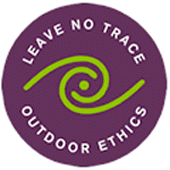STAY ON PUBLIC PROPERTY
Stay on designated footpaths whenever possible, and do not trespass on private property. You are responsible for helping maintain good relations between hikers and private property owners.
WEAR BRIGHT COLORS ONLY WHEN YOU NEED TO BE SEEN
Wearing bright colors during hunting season, particularly deer season, is a good idea. In fact, it may prevent injury or death. However, during other times of the year, bright reds, oranges and yellows serve to actually shrink the outdoors by visually intruding into the wide spaces and solitude which are part of the outdoor experience. When drab colors (browns, blues, and greens) are used for clothing and tents, individuals are visible at less distance, and more people can use the same general area without knowing of each other’s presence.
FINDING AND PROTECTING THE WATER
Sources of water in many areas are often limited and can fail during dry periods-plan ahead! Remember to treat all collected drinking and cooking water by boiling for several minutes or with a commercial water filter. Always wash your dishes or yourself a few feet away from the edge of a lake or stream. This way the soil acts as a filter, preventing soap suds and scraps of food from polluting the water. After washing your dishes, rinse them a safe distance from the bank. A few feet can make a big difference.
KEEP PETS UNDER CONTROL
If you must bring your dog on the trail, make sure property regulations allow it. Keep your pet on a leash and under control. Make sure all pet waste is away from the trail. Do not allow your dog to bark at or chase other trail users or wildlife. Remember to bring food and water for your dog as well as for you.
TICKS
Ticks are going to congregate where they have the best chances of finding a host (human or pets) for hatching their larvae. It is best to avoid tall grass and thick brush. The most effective commercial insect repellents contain the active ingredient DEET or PERMETHRIM. Once a tick becomes embedded, it’s best to remove the tick using tweezers. You want to gasp the tick close to its head firmly pulling it straight out. Apply antiseptic to the bite after removal.
For more tick details please visit the Indiana State Department of Health following websites:
SNAKES
Indiana is home to 32 native snake species of which only four are venomous. Be mindful of where you step. If you leave a snake alone, it will leave you alone. When a snake bites a person, it does so in self-defense.
PLAN YOUR TRIPS
Before starting out, study maps of the area and learn the terrain. Be sure you are familiar with all the options of time, alternate routes, and weather. Do not forget the shorter daylight hours during late fall and winter. Be sure to travel with a first aid kit, map and compass, and cellular telephone (if available) and know how to use them. Remember to register at the nearest property office or gatehouse; for your safety, someone needs to know where you are.
PROPERLY DISPOSE OF LITTER
Burying trash and garbage was once the ethical way to dispose of litter outdoors. However, animals and frost action usually undid the efforts after the campers were on their way. Today, the problem is compounded by the high number of people using the same areas. The best policy is to carry out what you carry in. You might consider going one step further and carry out any trash less thoughtful people may have left behind.
BE CAREFUL WITH FIRE
To reduce the possibility of a forest fire, we suggest that you use a portable backpacking stove rather than a campfire for cooking. A portable stove cooks your meal long before a fire is ready. Another advantage is that it helps prevent fire-blackened rocks in areas where people camp. If you want a campfire, make sure it is permitted. Different properties may have different rules regarding campfires. Even those that generally allow campfires may ban them on a temporary basis because of dry conditions, fire danger, etc. Remember the old rule when building a campfire-use only dead and down wood where permitted. Do not break or cut tree limbs or trees, even dead ones; dead trees provide habitat for many birds and animals. One more tip on firewood-do not stockpile wood. While this was once considered a friendly gesture in remote areas, today it is one more thing which reduces the spirit of solitude and independence which people seek. Any campfire in a backcountry area should be in a pit 12 inches or less in diameter, and a three-foot diameter area should be cleared to mineral soil around the fire. Prior to leaving an area where a campfire was built, mix ashes with the soil, fill the pit, and cover the cleared area with the humus layer which was originally removed.
BE CONSCIENTIOUS WITH HUMAN WASTE
To eliminate waste in areas where restrooms are not provided, use areas at least 200 feet from any water supply and camping zone. Dig a small hole approximately eight inches deep, which can then be covered with loose soil and leaf litter to promote decomposition and sanitary conditions.


